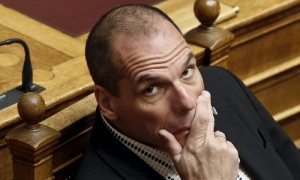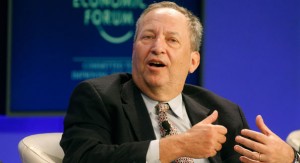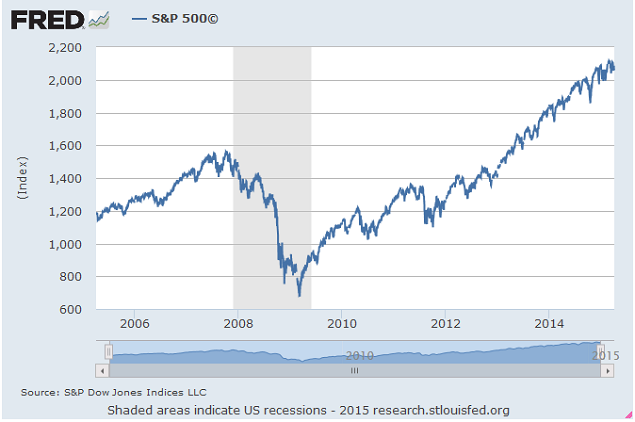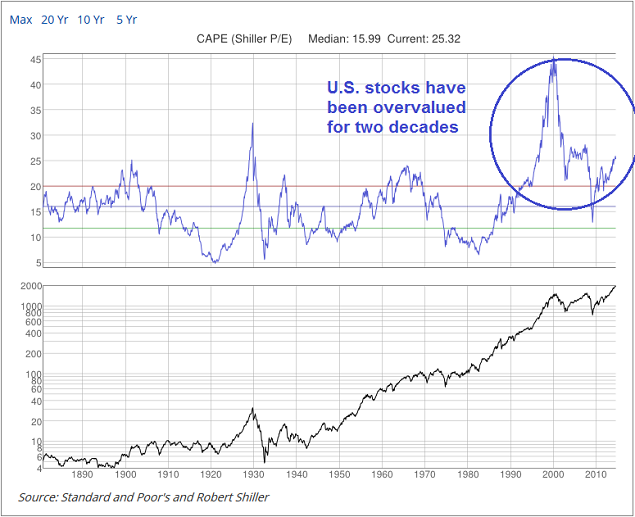Editor’s Note – Is another Greek Tragedy about to rock the European Union? Has the United States lost its ‘Superpower’ status in the universe of global economics? Is there another bubble about to burst in the U.S. stock Market?
If you say yes to all three, we have much more than a Greek Tragedy; we could have a melt-down of epic proportions say several leading economic voices. In Greece, they have a hefty payment due Thursday to the International Monetary Fund that may cause another political crisis in their government:
The worsening Greek debt crisis has reanimated talk within the ruling Syriza party of a snap general election if discussions with creditors fail, as the country faces a Thursday deadline to repay a €450m (£330m) loan to the International Monetary Fund.
The Greek finance minister, Yanis Varoufakis, during a parliamentary session in Athens on Thursday. He was scheduled to meet the IMF’s managing director, Christine Lagarde, in Washington DC on Sunday. Photograph: Alkis Konstantinidis/Reuters
The Greek finance minister, Yanis Varoufakis, held informal talks with the IMF’s managing director, Christine Lagarde, in Washington DC on Sunday, and Lagarde said he confirmed that the repayment would be made on Thursday.
Meanwhile, warnings of early elections underscored the political unrest in Athens. (Read more here at the Guardian.)
Their decisions and negotiations could ripple across the globe just as a bubble is about to burst here and some are calling it inevitable.
In addition, Larry Summers, the person once considered to take the job now held by Janet Yellin is telling us that he believes the U.S. has been surpassed by the likes of China already.
In his recent article entitled: “Time US Leadership Woke Up To New Economic Era,” he explains why he thinks the left and the right, and collectively all in Washington have really isolated the U.S. from global economic system and the ability to sway policy:
This past month may be remembered as the moment the United States lost its role as the underwriter of the global economic system. True, there have been any number of periods of frustration for the US before, and times when American behaviour was hardly multilateralist, such as the 1971 Nixon shock, ending the convertibility of the dollar into gold.
Larry Summers, former Secretary of the Treasury under Bill Clinton and former President of Harvard is now the President Emeritus and Charles W. Eliot University Professor of Harvard University
But I can think of no event since Bretton Woods comparable to the combination of China’s effort to establish a major new institution and the failure of the US to persuade dozens of its traditional allies, starting with Britain, to stay out of it.
This failure of strategy and tactics was a long time coming, and it should lead to a comprehensive review of the US approach to global economics.
With China’s economic size rivalling America’s and emerging markets accounting for at least half of world output, the global economic architecture needs substantial adjustment.
Political pressures from all sides in the US have rendered it increasingly dysfunctional.
Largely because of resistance from the right, the US stands alone in the world in failing to approve the International Monetary Fund governance reforms that Washington itself pushed for in 2009. By supplementing IMF resources, this change would have bolstered confidence in the global economy. More important, it would come closer to giving countries such as China and India a share of IMF votes commensurate with their new economic heft.
Meanwhile, pressures from the left have led to pervasive restrictions on infrastructure projects financed through existing development banks, which consequently have receded as funders, even as many developing countries now see infrastructure finance as their principle external funding need. (Read more here at Zero Hedge.)
Now read this take on that darn bubble:
Disaster Is Inevitable When The Two Decade-Old Stock Bubble Bursts
By Jesse Colombo – Forbes
Six years after the Global Financial Crisis, the U.S. stock market continues to soar to new heights with nary a pullback or correction. In this piece, I will explain why the stock market is experiencing a new bubble that is actually another wave of the bubble that has existed since the mid-1990s.
A two-decade old bubble? Yes, you’ve read that correctly. Most people will consider this assertion preposterous, but the facts don’t lie. Though the U.S. stock market has been experiencing a bubble for two decades, it will not last forever. I believe that the ultimate popping of this bubble will have terrifying consequences for both investors and the global economy that is tied so closely to the stock market.
The SP500 stock index has more than tripled since its low in 2009, but that doesn’t mean that we are out of the woods. On the contrary, this is the calm before the storm.
Source: St. Louis Fed
Since the mid-1990s, the U.S. economy and stock market has experienced three different bubbles: the 1990s Dot-com bubble, the mid-2000s housing bubble, and now another bubble that includes stocks, bonds, tech startups, certain segments of the housing market, higher education, and much more. I believe that this new bubble is creating what I call a “Bubblecovery” or a bubble-driven temporary economic recovery that will end in another crisis.
The U.S. Federal Reserve also created a Bubblecovery in the early-2000s to recover from the Dot-com bust, which led to the housing bubble. After the housing bubble burst, the Fed inflated the post-2009 Bubblecovery. After each bubble/Bubblecovery ends, the Fed simply inflates another bubble to recover from the last one. In essence, the U.S. economy and stock market has been in a bubble cycle for the past two decades. Each time, the bubble gets larger, and the Fed has to keep re-inflating it to avoid the economic Depression that would occur if asset prices were allowed to find their true value.
The incessant push to inflate our economy and financial markets has created an unprecedented situation in which stocks have been trading at overvalued levels for a record length of time. Nearly every stock market valuation indicator is giving the same reading: stocks are currently at levels that preceded other major historic busts.
For example, look at the Cyclically Adjusted P/E Ratio (CAPE), or the price-to-earnings ratio based on average inflation-adjusted earnings from the previous 10 years. The 1929 Stock Market Crash and 1970s stagnation occurred after the CAPE rose over 20 – a level that indicates stock market overvaluation. Incredibly, the CAPE has remained over 20 for much of the past two decades, aside from a few short months during the Global Financial Crisis. Without constant Fed intervention, there is no doubt that the U.S. stock market would have corrected violently like it has in the past.
Source: VectorGrader.com





